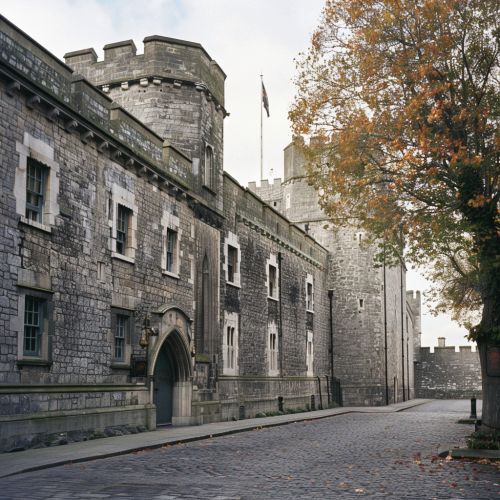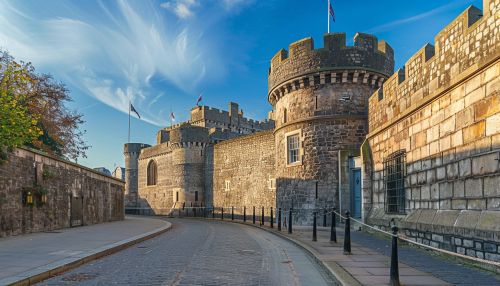Lord Deputy of Ireland: Difference between revisions
(Created page with "== Overview == The office of the '''Lord Deputy of Ireland''' was a significant position within the English and later British administration of Ireland. The Lord Deputy was the chief governor of Ireland, acting as the monarch's representative. This role evolved over centuries, reflecting the changing political landscape and the shifting dynamics between Ireland and the English Crown. == Historical Background == The position of Lord Deputy originated in the medieval pe...") |
No edit summary |
||
| Line 53: | Line 53: | ||
* [[Irish Free State]] | * [[Irish Free State]] | ||
[[Image:Detail-91491.jpg|thumb|center|An image of Dublin Castle, the seat of the Lord Deputy of Ireland.|class=only_on_mobile]] | |||
[[Image:Detail-91492.jpg|thumb|center|An image of Dublin Castle, the seat of the Lord Deputy of Ireland.|class=only_on_desktop]] | |||
[[Category:History of Ireland]] | [[Category:History of Ireland]] | ||
[[Category:Political history of Ireland]] | [[Category:Political history of Ireland]] | ||
[[Category:Irish governance and politics]] | [[Category:Irish governance and politics]] | ||
Latest revision as of 00:41, 21 June 2024
Overview
The office of the Lord Deputy of Ireland was a significant position within the English and later British administration of Ireland. The Lord Deputy was the chief governor of Ireland, acting as the monarch's representative. This role evolved over centuries, reflecting the changing political landscape and the shifting dynamics between Ireland and the English Crown.
Historical Background
The position of Lord Deputy originated in the medieval period, during the Norman invasion in the late 12th century. Initially, the title used was "Justiciar of Ireland," but it evolved into "Lord Deputy" by the 15th century. The Lord Deputy was appointed by the English monarch and was responsible for maintaining English control over Ireland, implementing royal policies, and managing the Irish Parliament.
Duties and Responsibilities
The Lord Deputy's primary duties included:
- **Governance:** Overseeing the administration of justice, maintaining law and order, and ensuring the implementation of the monarch's policies.
- **Military Command:** Commanding the English forces in Ireland and defending the territory against internal and external threats.
- **Economic Management:** Supervising the collection of taxes and revenues, managing royal estates, and promoting economic development.
- **Diplomacy:** Negotiating with Irish chieftains and foreign powers, and maintaining relations with the Anglo-Irish nobility.
Notable Lord Deputies
Several Lord Deputies left a significant mark on Irish history:
- **Sir Henry Sidney (1565-1571, 1575-1578):** Known for his efforts to extend English control over Ireland and his attempts to reform the Irish administration.
- **Thomas Wentworth, 1st Earl of Strafford (1632-1640):** His tenure is noted for his authoritarian rule and efforts to centralize power, which ultimately led to his execution during the English Civil War.
- **Arthur Chichester, 1st Baron Chichester (1604-1616):** Played a crucial role in the Plantation of Ulster, a significant event in the colonization of Ireland.
The Role in the Tudor Period
During the Tudor period, the role of the Lord Deputy became increasingly important as the English Crown sought to consolidate its control over Ireland. The Tudor monarchs, particularly Henry VIII and Elizabeth I, used the Lord Deputies to enforce their policies, including the suppression of rebellions and the implementation of the Reformation.
The Lord Deputy and the Irish Parliament
The Lord Deputy had a significant influence over the Parliament of Ireland. They could summon and dissolve Parliament, and their approval was necessary for any legislation to pass. This control allowed the English Crown to ensure that Irish laws aligned with English interests.
Decline and Abolition
The role of the Lord Deputy began to decline in the 17th century, particularly after the Glorious Revolution and the establishment of the Kingdom of Great Britain in 1707. The office was eventually abolished in 1767, replaced by the office of the Lord Lieutenant of Ireland, which continued until the establishment of the Irish Free State in 1922.
Legacy
The legacy of the Lord Deputies is complex. They played a crucial role in the administration and governance of Ireland, but their actions often led to significant conflict and resentment among the Irish population. The policies implemented by the Lord Deputies, particularly during the Tudor and Stuart periods, had long-lasting impacts on Irish society and politics.
See Also
- Norman invasion of Ireland
- Anglo-Irish
- Plantation of Ulster
- Henry VIII
- Elizabeth I
- Parliament of Ireland
- Glorious Revolution
- Kingdom of Great Britain
- Lord Lieutenant of Ireland
- Irish Free State


